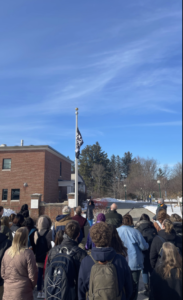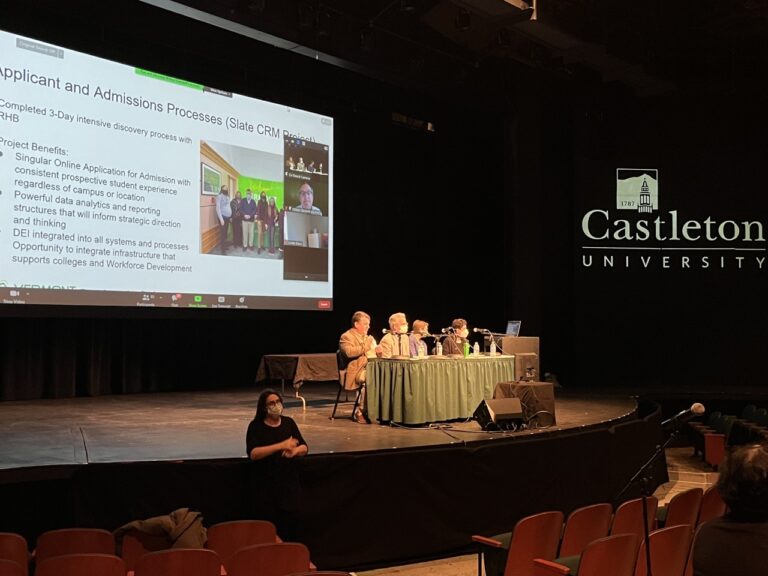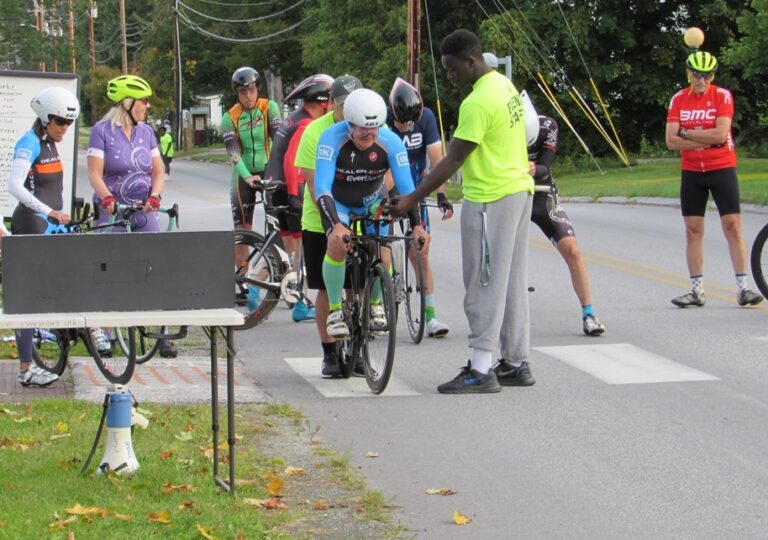Castleton can do better

First-year student Ruben Somda recently wrote an open letter to Castleton expressing his frustration over a lack of preparation, and therefore celebration, of Black History Month at the university.
“We as students of color should not be made to feel as if it is our responsibility to make these things a reality. We should not be the only ones at the forefront of celebrating such an important month like this, and we should not have to be made to feel as if our opinions matter only for them to be taken as suggestions and then swept under the rug,” Somda wrote.
According to Somda, the desire to write this letter came after a meeting with the Castleton chapter of the NAACP during which he and many of the other members felt that all of the responsibility of planning Black History Month events for the school was falling on them –
the students – while at the same time their ideas were not truly being considered.
Chapter Co-President Tajae Edwards and Secretary Kayon Morgan backed this up, adding that it had been suggested to them by administration that they push back the Black History Fair they had planned until it was no longer during the month of February.
“It really bothered the group that they even thought of that,” Edwards said. “This is Black History Month, and we want to see it celebrated. We want to feel like we belong here. So, when we saw that it was, like, falling in between the cracks, we were kind of disgruntled.”
Morgan agreed.
“I feel like they didn’t prioritize that and kind of just said ‘settle’ in a sense,” said Morgan, adding, “We’ve kind of settled for the scraps and that made a lot of us upset because we shouldn’t feel like we have to settle in any aspect.”
These frustrations, however, have roots in issues that impact Black students and students of color year-round.
Students have raised concerns over a lack of policies to protect students from racism, a lack of faculty and staff of color, and a lack of overall support of students of color from the university.
One student, senior Obieze Ebo, shared an experience in which he was called the N-word by a white student at a Castleton party. Somda and Morgan shared experiences from their peers experiencing microaggressions on campus, including comments about students’ hair, use of slurs, and how one student even left their residence hall after being verbally assaulted.
“My concern then goes to ‘is that ever going to turn to physical violence?’ Because apparently according to school policies, they can’t really do anything substantial unless you show signs of being physically hurt … It shouldn’t get to that point,” Somda said.
Morgan cited this policy, as being one of the reasons she does not feel supported by Castleton as a whole, saying, “That’s not supportive to me at all. That’s not support.”
One thing that could help remedy this issue is having more students, faculty, and staff of color present on campus. Edwards pointed out that oftentimes being the only Black student or student of color in a classroom can be isolating, and it feels even more isolating when the professor is also white.
“In terms of protection, we don’t often get that from our peers, you know? And if it doesn’t come from the professors then what do we have?” Edwards said.
Sociology professor Luther Brown, who has worked at Castleton since 1984 and is one of only two Black professors, noted that some attempts to hire new professors fail due to deficiencies at the school, citing pay as one of the reasons. However, he too feels that it is important to hire faculty members of color.
“We are, of course, at some level models or potential models, and when they see us, they’re in a position to feel, ‘hey, I potentially have a support system here, and if I have a question or an issue I may not feel comfortable discussing with someone else I can go to one of those professors,’” Brown said. “The time for change is now and I suppose that the administration and others will take this into account when they go about the business of hiring people.”
This is not to say, though, that all Black students and students of color feel that the Castleton community does not support them.
Wyatt Jackson, a member of the football team, has never experienced any microaggressions or had any bad experiences relating to his race while at Castleton. Jackson feels supported by those he is closest to – his teammates, coaches, and professors.
“I wouldn’t say I get that support from every adult, every faculty member across the board here. I don’t think it’s a problem for me, I’m fine” said Jackson, adding, “I keep my inner circle very close… So, I don’t really open myself up to a lot of nonsense.”
Senior Domonique Thorne feels similarly and expressed his appreciation in Castleton flying the Black Lives Matter flag on campus.
“When they put up the Black Lives Matter flag last year, like they had me come and speak, which was sweet… It’s making our voice known … And then I get emails from the NAACP every week, every few weeks, and it’s nice to see that somewhere in Vermont, other than Burlington, of course, is taking the steps to finally support other communities like us,” Thorne said.
Some students, however, see simply flying the flag as performative when they don’t see the actions of the university aligning with the goals of the Black Lives Matter movement.
“They have tried to do some stuff, you feel me, they just don’t know what to do that’s really effective. They put up the Black Lives Matter flag and, you know, it was so bad that only a handful of the Black community on campus came out because they just felt like they were doing it not because they care, but just because it’d be nice to have a flag up,” Ebo said.
Somda spoke to this directly in his letter, writing, “That flag should be a vow that you make and actively seek to keep. A vow to actively create spaces for your black students of color and for all students of color to feel safe, represented, and seen. A vow to scrutinize the ways things have been run and to do your part in finding ways to educate and continue educating the student body on the importance of inclusion.”
Two of the administrators at the head of this issue are Interim President Thomas Mauhs-Pugh and Dean Francesca Catalano, who also serves as chair of the Diversity, Equity, and Inclusion (DEI) Committee at Castleton. Edwards and Morgan spoke to how they see the effort Mauhs-Pugh and Catalano are putting in, but how they would like to see that effort extended.
“I don’t want anyone for a second thinking that there’s any, like, bashing towards their character. I think that they try their best, but they can’t be the only ones trying … I mean, we barely interact with them. We interact with our professors, we’re interacting with staff in the dining hall, staff in Fireside, staff all over,” Morgan said.
Mauhs-Pugh and Catalano both acknowledged how important these concerns are, and how they would like to address them. According to Catalano, the DEI Committee held a two-part implicit bias training last semester, and are working toward offering additional trainings every semester, that would be “useful to faculty, staff, and students, for that matter,” Catalano said.
They are also addressing students’ concerns over not currently having a student of color advocate on campus.
“We’ve been actively seeking [a student of color advocate]. It’s a priority. Again, it’s one of the tenets and it’s a goal, it’s definitely a highest priority, to find someone that students feel comfortable with to talk to on the frontlines who can help manage and escalate, as needed, concerns that arise,” Catalano said.
According to Mauhs-Pugh, seeking faculty of color is a priority, and should be a priority as the upcoming merger approaches.
“We actively seek people of color in all our searches currently and will continue to do so, but the future of staffing across all areas will be coordinated under the emerging Vermont State University … But that does need to be, and I believe will be, part of the emerging coordination of hiring decisions going forward,” Mauhs-Pugh said.
As for Black History Month next year, Mauhs-Pugh and Catalano have made plans to form a new committee dedicated specifically to planning events for that month, that will begin meeting at the start of the new school year.
Edwards and other students of color are hopeful.
“Talk is cheap if you don’t put the work in to make it happen. Hopefully they can take whatever they learn from this experience and see that this is really important to students, and students will go above and beyond to make sure their voices are heard and not ignored,” Edwards said.








